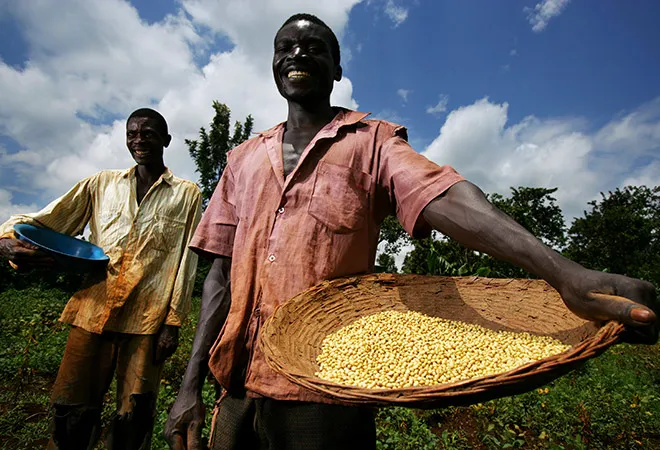-
CENTRES
Progammes & Centres
Location
Kitchen gardens can help strengthen food security and improve income generation and livelihoods.

World hunger is on the rise: an estimated 821 million or one in every nine people in the world are under-nourished.
Food insecurity also contributes to obesity and under-nutrition, and this double burden of malnutrition coexists in many countries. Poor access to food increases the risk of low birth-weight and stunting in children, which is linked to adult obesity.
As per the 2018 Global Hunger Index, the level of hunger and malnutrition worldwide is considered ‘serious,’ with a GHI score of 20.9. Hunger and malnutrition are still much too high in dozens of countries, although it varies enormously by region: the regions of South Asia and South of the Sahara are at 30.5 and 29.4 of GHI score respectively; these numbers reflect serious levels of hunger. Africa and Asia bear the greatest share of all forms of malnutrition, with more than half of all stunted children under five living in Asia, and more than one third in Africa. Africa is the only region where the number of stunted children has risen from 50.3 to 58.8 million since 2000. Followed by Asia, Africa has also shown significant increase in the number of overweight citizens.
Although every country in the world is affected by malnutrition, progress towards reversing this disaster is very slow. At this pace, it seems impossible for Africa to achieve the SDG target of zero hunger, which would end all forms of malnutrition. Climate change poses an additional threat to sustainable development and can undermine progress toward eradicating hunger, malnutrition, and poverty. According to the FAO, access to nutritious food is the key to food security and the high spending on ‘convenience’ food, which is deficient in vitamins and minerals, is a major cause of concern.
To combat the issue of food security, there is a need to look at multiple strategies. An extensive review on maternal and child under-nutrition gathered from 36 countries has suggested dietary diversification as a key strategy, and suggests how home gardening can improve nutrition.
A systemic review from Africa has shown how home gardens can play a positive role in alleviating food security. Micro gardening is an innovative way to ensure food security and create employment for young people; it is also an alternative way for households to generate an extra income. Home gardening supplements the ration and provides essential nutrients by ensuring that the family has direct access to food. Moreover, a review from South Africa on school gardens have shown how they improve nutrition and food preference in children.
A case study from Zimbabwe shows how nutrition gardens have had positive impacts on its citizens, at one hand it provides steady incomes to the family and on the second it also helps in curbing diet related diseases. A study from rural Tanzania documented how kitchen gardens can produce fruits and vegetables high in micro nutrients, and address food insecurity and malnutrition issues. Findings from a study in Western Kenya found that access to community based nutrition interventions like kitchen gardens helped reduce stunting in children.
Furthermore, a meta-analysis of 22 case studies on domestic/community gardens from around the world provide evidence on the positive effects of gardening: these include improved physical, psychological and social health, which have a long-term effect on wellbeing. Case studies from India and Bangladesh reiterate the potential of nutrition in bettering indicators of food security and reducing incidents of diseases associated with malnutrition. A cost-effective and holistic kitchen garden model developed in India that meets dietary requirements is being adopted in state ministries/departments as part of their ongoing program to prevent malnutrition among women and children.
Africa and India can become self-sufficient and reduce the global problem of food insecurity and malnutrition. Kitchen gardens can help strengthen food security and improve income generation and livelihoods. However, the way forward lies in scaling up the kitchen garden by creating awareness about its potential and expanding it across regions.
The views expressed above belong to the author(s). ORF research and analyses now available on Telegram! Click here to access our curated content — blogs, longforms and interviews.

Dr. Shoba Suri is a Senior Fellow with ORFs Health Initiative. Shoba is a nutritionist with experience in community and clinical research. She has worked on nutrition, ...
Read More +